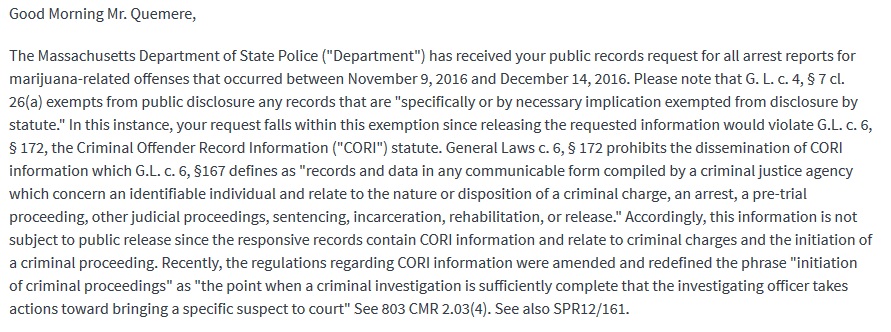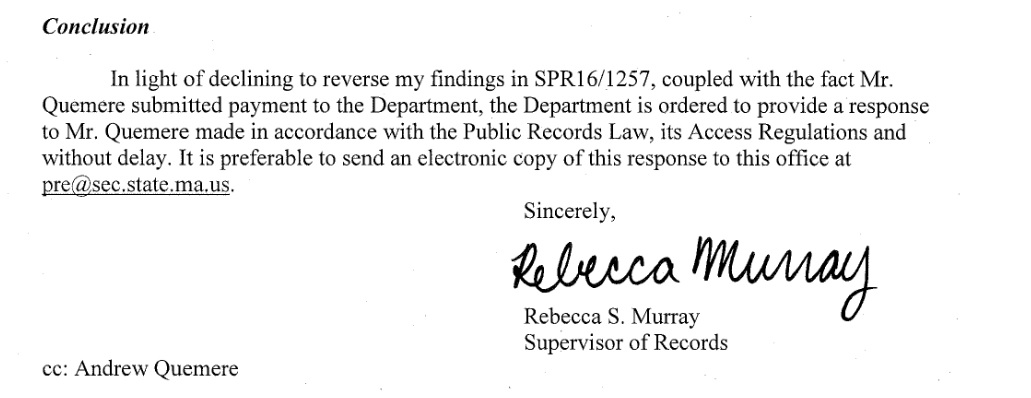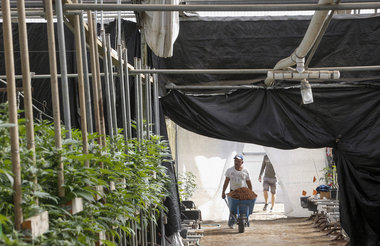Baron23
Well-Known Member
What’s going to happen to legal weed in the Massachusetts legislature?
By Bob Salsberg, The Associated Press
BOSTON — After a week of sharp divisions and heated rhetoric over the future of the state’s recreational marijuana law, it’s now up to a conference committee of six legislators to try and sort everything out.
On one hand, there’s a House bill that infuriated pro-marijuana activists by proposing a major overhaul of the voter-approved law. On the other, a more restrained Senate bill won praise from the groups behind the November ballot question.
Democratic Rep. Mark Cusack, the House bill’s lead author, suggested before the votes that the two chambers were in about 80 percent agreement on their respective approaches.
There is, in fact, more common ground than readily apparent given the dialogue of the past week.
Neither the House nor Senate changed the current legal possession limit of up to 1 ounce of pot or home growing provisions that permit up to a dozen plants per household.
Related stories
Both bills allow medical marijuana dispensaries to transition into for-profit companies, but eliminate the head start those companies had been given over other applicants for recreational licenses. Both set guidelines for the testing of all marijuana products by independent labs, and standards for packaging, labeling and marketing.
Both adopt diversity measures designed to level the playing field for minority and women cannabis entrepreneurs, and address the historically disproportionate impact the “war on drugs” had on minority neighborhoods. And with no currently reliable test for marijuana impairment, both ask a task force to study issues around driving under the influence.
Similarities aside, barriers to reaching a deal by the Legislature’s self-imposed July 1 deadline are many. A few:
‘Repeal and Replace’ or ‘Amend and Improve’?
Perhaps the most fundamental difference between the competing bills: The House repealed the ballot question and wrote an entirely new law; the Senate keeps the existing law while offering changes.
More than just legislative sausage-making, it’s a central question conference committee members must resolve before doing much else. Do they start from scratch as the House did or keep on the books — with modest revisions — the law 1.8 million Massachusetts voters approved? The answer may well dictate the parameters of the final bill.
High on taxes?
The sizeable gulf between marijuana tax rates — 28 percent in the House, 12 percent in the Senate — garnered the most public attention during the past week’s debates.
It may also be the easiest issue to resolve should lawmakers simply agree to split the difference. But the underlying issues are more complicated.
Senators insisted on a tax low enough to encourage consumers to buy from licensed marijuana stores, thereby crushing the underground market for the drug. House lawmakers sought a tax high enough to pay for what the bill described as a “rigorous regulatory scheme” for the cannabis industry. The House also set an ambitious goal of directing $50 million in marijuana revenues to substance abuse treatment programs.
It’s unclear if a compromise tax of about 20 percent satisfies either or both sets of objectives.
Power to the people?
The House grants local governing bodies — city councils and town meetings for example — power to ban or limit pot shops from opening in their communities. The Senate bill leaves unchanged the current law that requires a voter referendum to shut the door on marijuana establishments.
There is no readily apparent compromise, so barring a creative solution one side must give on this issue.
If no agreement, what then?
Failure by legislators to reach a deal by next Saturday would simply leave the voter-approved law intact, and allow Treasurer Deb Goldberg to begin appointing the Cannabis Control Commission. But a possible scenario in the event of deadlock would be to have conferees separate out and approve items they have consensus on, while resolving to address thornier issues further down the road.
- "The House repealed the ballot question and wrote an entirely new law; the Senate keeps the existing law while offering changes."
- "Do they start from scratch as the House did or keep on the books — with modest revisions — the law 1.8 million Massachusetts voters approved? The answer may well dictate the parameters of the final bill."
I don't understand how this is even a question in a democracy. MA residents...get outraged. I don't car what your position is on MJ, you should be enraged at the high handed and elitist views taken by your lower house in the face of an overwhelming, direct democratic vote by the electorate. Go get em, guys. Surprised nobody has filed a law suit yet.
By Bob Salsberg, The Associated Press
BOSTON — After a week of sharp divisions and heated rhetoric over the future of the state’s recreational marijuana law, it’s now up to a conference committee of six legislators to try and sort everything out.
On one hand, there’s a House bill that infuriated pro-marijuana activists by proposing a major overhaul of the voter-approved law. On the other, a more restrained Senate bill won praise from the groups behind the November ballot question.
Democratic Rep. Mark Cusack, the House bill’s lead author, suggested before the votes that the two chambers were in about 80 percent agreement on their respective approaches.
There is, in fact, more common ground than readily apparent given the dialogue of the past week.
Neither the House nor Senate changed the current legal possession limit of up to 1 ounce of pot or home growing provisions that permit up to a dozen plants per household.
Related stories
- UPDATE: Massachusetts Senate marijuana plan gets overwhelming approval; House negotiations await
- Massachusetts House passes bill to “repeal and replace” voter-approved recreational marijuana law
- Massachusetts Senate to House: High marijuana tax rate “not the will of the voters”
- Under pressure, Massachusetts lawmakers delay vote on recreational marijuana revisions
- Start saving up: Massachusetts recreational weed taxes could be set as high as 28%
Both bills allow medical marijuana dispensaries to transition into for-profit companies, but eliminate the head start those companies had been given over other applicants for recreational licenses. Both set guidelines for the testing of all marijuana products by independent labs, and standards for packaging, labeling and marketing.
Both adopt diversity measures designed to level the playing field for minority and women cannabis entrepreneurs, and address the historically disproportionate impact the “war on drugs” had on minority neighborhoods. And with no currently reliable test for marijuana impairment, both ask a task force to study issues around driving under the influence.
Similarities aside, barriers to reaching a deal by the Legislature’s self-imposed July 1 deadline are many. A few:
‘Repeal and Replace’ or ‘Amend and Improve’?
Perhaps the most fundamental difference between the competing bills: The House repealed the ballot question and wrote an entirely new law; the Senate keeps the existing law while offering changes.
More than just legislative sausage-making, it’s a central question conference committee members must resolve before doing much else. Do they start from scratch as the House did or keep on the books — with modest revisions — the law 1.8 million Massachusetts voters approved? The answer may well dictate the parameters of the final bill.
High on taxes?
The sizeable gulf between marijuana tax rates — 28 percent in the House, 12 percent in the Senate — garnered the most public attention during the past week’s debates.
It may also be the easiest issue to resolve should lawmakers simply agree to split the difference. But the underlying issues are more complicated.
Senators insisted on a tax low enough to encourage consumers to buy from licensed marijuana stores, thereby crushing the underground market for the drug. House lawmakers sought a tax high enough to pay for what the bill described as a “rigorous regulatory scheme” for the cannabis industry. The House also set an ambitious goal of directing $50 million in marijuana revenues to substance abuse treatment programs.
It’s unclear if a compromise tax of about 20 percent satisfies either or both sets of objectives.
Power to the people?
The House grants local governing bodies — city councils and town meetings for example — power to ban or limit pot shops from opening in their communities. The Senate bill leaves unchanged the current law that requires a voter referendum to shut the door on marijuana establishments.
There is no readily apparent compromise, so barring a creative solution one side must give on this issue.
If no agreement, what then?
Failure by legislators to reach a deal by next Saturday would simply leave the voter-approved law intact, and allow Treasurer Deb Goldberg to begin appointing the Cannabis Control Commission. But a possible scenario in the event of deadlock would be to have conferees separate out and approve items they have consensus on, while resolving to address thornier issues further down the road.
- "The House repealed the ballot question and wrote an entirely new law; the Senate keeps the existing law while offering changes."
- "Do they start from scratch as the House did or keep on the books — with modest revisions — the law 1.8 million Massachusetts voters approved? The answer may well dictate the parameters of the final bill."
I don't understand how this is even a question in a democracy. MA residents...get outraged. I don't car what your position is on MJ, you should be enraged at the high handed and elitist views taken by your lower house in the face of an overwhelming, direct democratic vote by the electorate. Go get em, guys. Surprised nobody has filed a law suit yet.
Last edited:












